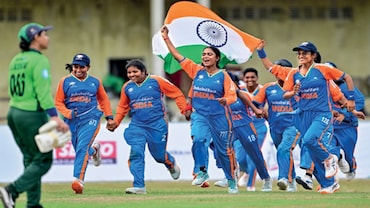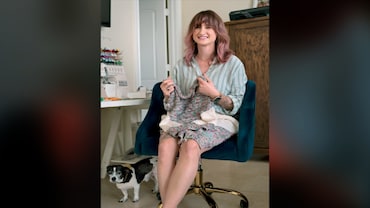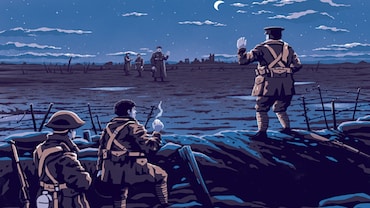Notes from Grief Camp
Every summer, more than a hundred children come together to spend a weekend swimming, climbing and canoeing. They also learn to deal with death
 illustrations by Tallulah Fontaine
illustrations by Tallulah Fontaine
In June 2022, four boys bonded inside a summer camp cabin. After throwing loose shirts on to shelves and spreading sleeping bags on to sandy mattresses, a game of tag around the bunk beds quickly evolved into ‘the floor is lava’.These boys, between the ages of 5 and 7, shared a link they didn’t yet know about: each had lost a father. And I, their camp counsellor for the weekend, had lost mine too.
But ‘lost’ wasn’t the right word. As my co-counsellors and I had learnt from our training, being specific with language was imperative at grief camp. It was better to avoid euphemisms such as ‘passed away’ and ‘lost’, as they could inadvertently add confusion to despair. In a child’s mind, when something is lost, it can also be found. Our fathers would not be found.
“Do you know why you’re all here?” asked our social worker once the boys settled into silence. Afternoon sunlight rippled over the wooden floor we sat on. “To have the best time ever!” the youngest replied. “And to play basketball!”
“Yes, that’s true,” the social worker said. “But there’s another reason you’re here … Every single kid at this camp, including some of your counselors, had someone important to them die.”
The boys looked at one another, unsure of what to say next.
The ensuing days at this summer camp in McKellar, Ontario, 100 kilometres north of Toronto, would be full of traditional camp activities. More than a hundred boys and girls would climb the high ropes, jump into the lake and roast marshmallows around campfires.
But beneath the cheery surface, this was a different type of programme. Here, a group of grieving kids—and the adults overseeing them—would try to find solace in the outdoors.
I first heard about Camp Erin about a year after my father’s funeral. A friend whose dad had also died sent me a link to the programme, telling me the organization was recruiting volunteers. The programme was created by the Eluna Network, an organization based in the United States that provides resources for children affected by grief. One of its founders, Jamie Moyer, is a former professional baseball player.
The annual weekend was inspired by Erin Metcalf, a 15-year-old girl Moyer and his wife, Karen, met in the late ’90s through the Make-A-Wish Foundation. Erin had lung cancer. When she was hospitalized, she repeatedly expressed concern for other visiting children as well as her own siblings, saying that she wanted to ensure they got support as they, too, navigated this scary reality.

When Erin died at the age of 17 in 2002, the Moyers felt that creating a ‘grief camp’ to fulfill Erin’s wishes would be a fitting tribute. And since then, hundreds of summer camps throughout North America have offered their facilities every year for the free weekend programme.
I felt hesitant about volunteering. I didn’t doubt the programme’s merits; summer camp offered some of the most important experiences of my young life. But I couldn’t reconcile the mix of bereavement and camp. What would we do—sit around a campfire and cry into each other’s shoulders? As counsellors, would we spew platitudes about grief dissolving with time? Would there be moments of emotional vulnerability that I wouldn’t know how to respond to? Most of all, I wondered if I’d really be able to help any of those kids experiencing the death of a loved one so early in life.
My father died when I was 25, old enough to see that I was privileged to grow up with him. The kids at the camp were dealing with something different. They were grieving not only what they had but what they would never have: a father or mother teaching them how to drive or cheering at their high school graduation or celebrating their first job.
Most adults don't deal well with death. We avoid talking about loss, as though keeping the words out of our mouths will also keep the thoughts out of our minds. A 2019 survey conducted by online medical resource WebMD found that adults experiencing grief often feel rushed to “get over it.” Nearly three-quarters of respondents had grieved a death in the past three years, and a little more than half said they felt an expectation to “move on” soon after.
For children, it’s different. Nicky Seligman, a child and adolescent grief counsellor and clinical director of Camp Erin Toronto for the summer of 2022, speaks of the “misconceptions and myths in society and in the media” regarding bereavement.
Seligman calls the way grief is often portrayed on screen, with characters in all-black clothing or a grieving lover falling to his or her knees before a rain-soaked grave, “one dimensional.”
“When you’re working with kids, a lot of it is about debunking those myths and helping them really understand grief and all the different feelings and behaviours they may have.”
Seligman’s words reflected my first moments at Camp Erin, after the kids were told that most of the camp was grieving the death of someone special.
“You too?” the youngest asked, his big eyes peering my way.
“Yeah. Me too.”
“Who?”“My dad.”
His little face formed an expression of empathy that seemed beyond his years. “How did he die?”
“Cancer,” I said.“What’s cancer?” asked another camper.
“It’s a disease where your body shuts down from bad cells that spread,” I said. “It was really hard and scary.”
We were trained to lean into open dialogue like this and express vulnerabilities too often bottled up. This would make children feel less alone in their own confusion. “It’s not a child’s job to open these conversations,” said Andrea Warnick, a registered psychotherapist, nurse and thanatologist (or death researcher) who facilitated Camp Erin Toronto’s grief training, in a phone interview. “That’s an adult responsibility—to teach kids that we can talk about the hard things.”
“The North Wind blows if you love chocolate ice cream!” shouted Ken, the programme director, a bearded, high-energy guy whom campers naturally gravitated toward. He was standing with a megaphone at the centre of a field, surrounded by more than a hundred kids and volunteers.
The moment he called out, all the chocolate ice cream lovers launched off, running across the field to find another spot in the circle.“The north wind blows” is a simple icebreaker. My campers grabbed my arms and yanked me for the sprint. One camper jumped on for a piggyback as we cannoned across the field.
“The north wind blows if … you can’t wait to swim tomorrow before breakfast!” Ken yelled. Once again, my four campers pulled me along. Sunshine shone down on us, and the branches of surrounding trees swayed in the breeze.
Slowly, Ken’s prompts turned serious. “The north wind blows if …” He paused for a second or two longer, and his voice softened. “You miss someone you love.”
Every camper, this time, and many staff changed spots in the circle. Ken started getting more specific.
“The north wind blows if … your mother died.”
Kids looked around. A silence settled. At a slower pace this time, a group of boys and girls, scattered throughout the field, shuffled to new spots. As did a cluster of adults.
The campers exchanged glances, noticing all the other kids who had shared a similar experience of grief.
“The north wind blows if … your father died.”
I crouched down next to my boys. “That’s all of us,” I said gently.
Two of them grabbed my hands, one of them grabbed an arm, and another hung on for the piggyback. Together, we moved to another spot in the circle.
“The north wind blows if … having someone you love die was really scary and sad, and sometimes you feel alone and confused.” Our eyes said what words couldn’t. Again we moved to another spot.
“The north wind blows if … even though you miss that person, and you’re sad, you could still be happy and have fun!”
“I’m not sure, guys,” I said, bending low. “I think we need to be sad all the time, right?” Hoisting two kids on to my shoulders, I shouted, “Wrong!” We burst across the field, a whir of giggles in our wake.
When talking about how kids experience grief, Warnick described it as a puddle: something easy to jump in and out of. For adults, grief can feel more like an ocean, its vastness debilitating.
Children, Warnick explained, can abruptly transition from feeling devastated one moment to joyful the next. This is healthy and normal. Happiness doesn’t disqualify grief, she said. “Happiness is part of grief.”
Adults, meanwhile, are less able to transition from one emotion to the next. “I think a common myth in grieving adults—and I see this in older teens too—is this ‘black hole phenomenon,’ ” Warnick said, where grievers believe that they are going to get swallowed whole and remain stuck.
The irony is that this fear of getting stuck becomes the real trap. When we deny sorrow, “there’s a blunting of feeling,” she says. The best way to experience the positive feelings that grief does not disqualify, says Warnick, is by “opening it all up.”
I could relate. After my father died, I remember armouring my mind against the pain. The result was a head-to-toe numbness that prevented me from feeling anything at all. But only days after my dad’s funeral, during a hike, the spring leaves and open air seemed to offer permission to unblock my emotions. I sat down and leaned against an old cedar. The mental turmoil I had pushed aside leaked out, then cascaded. I wept and yelled.
Surrender such as this, Warnick said, is key. It’s the ultimate difference between how adults and children process death. “Many kids, especially the younger they are, just allow themselves to experience it.”
Withdrawal, exhaustion, anger, fixation, depression and distraction are all behaviours that grief counsellors identify in kids. But they are often less prolonged than in grown-ups.

After lunch on the first day of camp, as we were sitting in the cabin, the social worker prompted us to reveal photos of our fathers, which most of the boys’ mothers had packed.
What followed was a sort of show-and-tell, featuring fathers who had died of various causes, from tragic accidents to illness. I showed a picture of my dad, smiling as he sat on a swing set.
My co-counsellor, Julia, showed a photo of a young man in a yellow shirt. “This is my son, Clayton,” she told us.
Julia is a mother of three boys. Her oldest, Clayton, died of an accidental drug overdose in September 2017. He was nine days away from his 23rd birthday. She first volunteered at Camp Erin Toronto in June 2019, and after a pandemic-enforced hiatus, returned for a second time in June 2022.
Julia and I became fast friends. We were a team, stopping our four troublemakers from their inclinations to jump off high structures, tip canoes and, once, eat bowls of white sugar for breakfast. Her instincts for ensuring the kids always had enough sunscreen, hydration and nutrition, along with her boundless patience, reminded me that she was a veteran mom of three boys.
Our campers knew that they had permission to feel however they chose and to lean into the excitement and fun. They rolled down grassy hills. They found and named three caterpillars (Gerry, Larry and Harry). They danced onstage for the talent show. They raced from one activity to the next. It was exhausting, but also energizing.
Julia noted the quick bond the boys felt toward me. “They heavily related to you,” she reflected during our phone call. Over that weekend, she felt I acted as a male figure for our group, a facilitator of mischief and horseplay. “The fact that you were there and you had lost a father too—that helped them connect really quickly.”
Julia also recalled a moment, after we paddled canoes, when the youngest boy turned to her and said, “This is the best day of my life.” This was at a grieving camp.
The lake shimmered with an orange glow as the whole camp sat before a fire pit and an evening wind rolled in, carrying the forest’s aroma of cedar and oak. In place of a fire, however, we had our attention on a large blue board. Painted on a white piece of fabric strung across the top were the words “In Memory Of …”
As Ken softly strummed an acoustic guitar, cabin groups were called forward for what was known as the ‘photo ceremony’. One at a time, children revealed a photo of the person they were grieving. They declared, sometimes in quaking voices, how the person had died, before clipping the image to the board.
“This is my dad. He died of suicide.”
“This is my brother. He died of a drug overdose.”
“This is my mother. She died of cancer.”
Soon, every inch of the blue board was plastered with smiling faces. My campers sat close to me, all of us watching the scene unfold. Julia, to my left, threw an arm around my shoulder, and the simple—maybe a little clichéd—lesson of the weekend suddenly became pronounced: togetherness makes sorrow a little easier to bear.
When our cabin was called up, our four boys spoke bravely about their fathers. After them, I shared the image of my dad and put it up on the board.
Seeing him there, amid all the mothers and fathers, brothers and sisters, sons and daughters, I reminded myself he wasn’t lost. And neither were we.
© 2023, Mitchell Consky. From The Walrus, 9 August 2023, thewalrus.ca.






